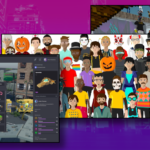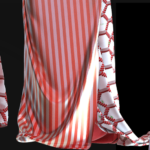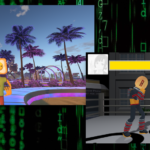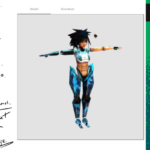In the past months Crucible Network has become one of the most vocal companies when it comes to digital identities in the metaverse. That’s not without reason, because they are working on the tools that need to connect gaming giants like Activision Blizzard, Ubisoft and Electronic Arts with virtual worlds, anonymous digital identities and crypto economies.
In the metaverse every person can have multiple digital identities. Perhaps you use one per game, but having one identity across multiple games or virtual worlds is also possible. Another identity can be for business relationships, while you might need a separate one for government-related interactions. The thing is, everybody can have multiple identities. These identities have their own crypto wallet, their own visual style, their own transaction and communication history and of course their own NFTs.
This is also where Crucible Network comes into place. These guys are working hard to create a layer between game development and blockchain technology. This layer needs to give users one account with multiple identities, while also allowing users to shop on an NFT marketplace, transfer tokens or communicate with friends. These aren’t just shallow thoughts, as co-founder Ryan Gill has been working on this for two years already.
Introducing the Agent
As a gamer, a citizen of a virtual world, or a person in the metaverse, you will need an account. In these accounts, which are strictly personal, users can have multiple identities or personas. Every persona has an avatar attached to it. You can imagine that you need to a certain persona to play The Sandbox, and another one to play Fortnite. However, other personas will be interoperable as well. Crucible calls the software that manages all your online personas, the Agent. This system allows for verified, but anonymous participation.
What’s one of the most interesting parts about Crucible’s avatar or persona system, is the option to set privacy options per avatar. People can camouflage their avatars, and therefore make sure that the avatar can’t be traced back to your real identity. However, in the background the anonymous avatar is of course linked to your identity. Therefore malicious behavior using one persona can have negative consequences for potentially every persona.
Right now the avatar package, better known as the Emergence SDK, is available for Unreal Engine. That means that every game using the Unreal Engine, could integrate this system freely. Furthermore Crucible is working on support from Unity, which is by far the most popular engine used for game development right now.
Open standards for digital identities
We’ve been talking about digital identities and the needs for an open standard before. For example, Crypto Avatars is doing something like this. Crucible is also looking at open standards, for example for digital fashion. The things is, as a user who’s more and more integrated into a virtual environment, it only makes sense to have an avatar that’s tailored to them. That does not mean creating an avatar based on a couple of option, but it means that users can customize their looks whenever they want.
Without a doubt NFTs will play an important role in this development. Crucible Network has for example created a demo that using the technology from Boson Protocol and digital fashion designs from The Fabricant. As a result someone buys an outfit for their avatar, and they can then redeem an extra token to acquire the same fashion item in the physical world. While The Fabricant creates digital fashion, Boson Protocol is all about the cross-over business area where digital and physical items collide.
What’s interesting about these type of businesses, is that they are completely different from what we use right now. Normally we buy items for ourselves: games, clothes, perhaps a Netflix subscription. However, Crucible sees their business as part of the upcoming Direct-to-Avatar (D2A) economy. As a result these purchases aren’t limited to one game or one gaming console. Instead these items are bound to a persona, and if the player wants to sell their digital assets, they can.
The interesting thing about the D2A economy, is that it’s open for anybody to participate. Similar to the ways we look at the metaverse, also the direct-to-avatar economy thrives on open standards. A truly open metaverse is needed for this economy to thrive, and within this economy there’s no place for walled gardens.
What about current game companies?
Over the years we’ve seen plenty of walled gardens in the games industry. Microsoft and Sony tried to wall their gardens even more when they battled over setting a standard for storage mediums: HD-DVD vs Blu-ray. Nowadays gaming platforms rely strongly on online sales, and even more on the sale of additional, downloadable content. There are even entire games distributes for free, that makes billions for selling in-game skins. I’m looking at you Fortnite and League of Legends.
However, without interoperability or an open economy, game companies still transform their games into walled gardens. The success of games like Minecraft and Roblox is showing game companies that shared game economies with users as revenue earning creators can be very beneficial for all involved. Some content creators have become production companies on their own, pushing millions in revenue. At the same time cross-platform gaming between Playstation, PC, Xbox and Nintendo Switch is increasing revenue, again highlighting the consumer’s desire for more open systems. Crucible wants to help build these open standards.
DAO for the metaverse
Now you know a bit what Crucible is all about, it’s time to talk play-to-earn. The Great Game is a meta game that generates characters and abilities based on your participation in the metaverse. Think about your NFT collection, but also your tokens and perhaps your DeFi investments. The type of content in your collection will influence the abilities from your persona. Which type of NFTs go into the Open Meta vault, depends on the community.
Crucible wants to establish growth by rewarding users who lock their assets for a longer period of time. Users can only deposit approved assets, while the DAO allows a voting process to add more assets. The DAO will continuously work on the valuation of all assets. What NFT fits into which bracket, depends on for example its value, age, nature, source and utility.
From the vault players can still display their NFTs on their avatar or rent our certain NFTs to earn passive income. In return players will earn redeemable credits, NFTs and they’ve got a chance to earn Open Meta governance tokens.
Welcome to The Great Game
There will also be something they refer to as The Great Game, which allows avatars to combat ‘using trading card game mechanics’. The Great Game ultimately is a meta game. Players can evolve their character with different types of NFTs, and perhaps battle in friendly or competitive fights. NFTs and governance tokens could be part of the play-to-earn rewards here.
However, this system isn’t only about playing. Also those who create content, share and promote content, or curate it, become part of the play-to-earn ecosystem. You earn rewards based on your behavior in the ecosystem. As a persona you will need to pass the Proof-of-Humanity test, while – we said it before – your actual identity remains private (if you choose so).
Crucible got our attention, and this will be an exciting journey in the months and years to come! Visit their website for more info.
[ays_quiz id=’79’]




